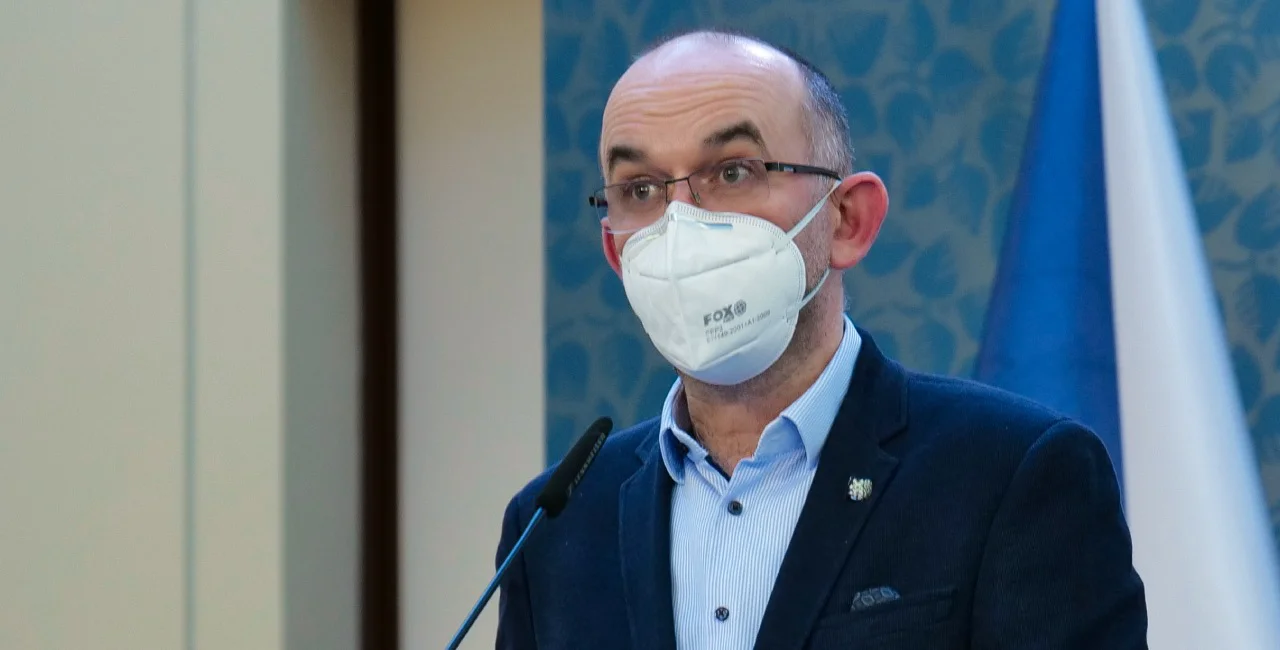Govt. meeting to discuss further measures against COVID
The government will hold an extraordinary meeting today at 5 p.m., followed by a press conference tentatively at 8 p.m. Health Minister Jan Blatný will present what further measures will be taken against the spread of COVID. No significant relaxation of rules is expected, but CNN Prima News reported that nature trips within the district could be allowed or that people might be allowed to go to their cottages outside the district. Blatný and Deputy Prime Minister Jan Hamáček previously stated that the tough restrictions should continue at least until Easter, which is April 4. Blatný should also outline what will happen after Easter. He previously stated he will want to prolong the state of emergency after March 28.
PARTNER ARTICLE
Blatný: schools could open in the second half of April
Some children could probably return to school next month if regular antigen testing is done, Health Minister Jan Blatný said at the lower house health committee meeting. "Currently, I cannot tell you the date when the children will return to school. It will probably be during the second half of April," Blatný said. The Health Ministry is negotiating the reopening of schools with the Education Ministry and professional groups. According to Blatný, it is possible that the years of school to reopened first will change compared to what had been previously announced.
Blatný compares maskless people to drunken drivers
Health Minister Jan Blatný is angry at people not following anti-coronavirus measures and compared them to people who get behind the wheel after drinking.
"Just as no one sits in a car after three shots and drives drunk, people shouldn't walk around without masks. … Otherwise it just won't work. It is not a police state," Blatný said.
He also advocated forbidding students who refuse to wear face coverings from attending school. "People who do not want to cooperate have an opportunity for education to take place, but not at school. This is relatively simple, " Blatný said.
COVID travel passports might be introduced as of June
The unified EU COVID passport, which the European Commission proposed yesterday, might start to be used as of late May or early June, Czech Foreign Minister Tomáš Petříček said, adding it will be a temporary solution until the World Health Organization (WHO) says the coronavirus pandemic is over. The COVID passport is to facilitate the cross-border traveling for those vaccinated, those with a negative test for COVID-19 and those with the relevant antibodies. The passport is important not only for tourism, but mainly for business meetings, working trips and people's visiting of their relatives across Europe, Petříček said. The proposed introduction of the travel certificate has also been hailed by Czech Regional Development Minister Klára Dostálová. "I believe that it will be a significant step towards the restart of tourism," she tweeted. The exact parameters of the travel pass must be agreed upon by the EU member states.
VÃtám návrh na zavedenà digitálnÃch zelených certifikátů, který zveÅ™ejnila EK. VěřÃm, že to bude významný krok k obnovÄ› cestovnÃho ruchu. Certifikáty by mÄ›ly sloužit k potvrzenà oÄkovánÃ, negativnÃho testu Äi prodÄ›lánà nemoci a Älenské státy by si je vzájemnÄ› uznávaly.
— Klara Dostalova (@DostalovaK) March 17, 2021
PES system to be modified again
New Czech chief public health officer Pavla Svrčinová will prepare modifications of the PES anti-epidemic system by next week, including clear criteria for the lockdown relaxation, Deputy Prime Minister Jan Hamáček, head of the Central Crisis Staff (ÚKS), said after the ÚKS meeting. The modifications of the PES system should also set the limits for lifting the lockdown rules, Hamáček added.
"The modified version of the PES system should be known by next week," Hamáček said.
The PES system was originally to set the rules for the tightening or relaxation of anti-coronavirus measures, based on its index on the scale from 0 to 100, corresponding to five degrees of epidemic alert. But the government is of the view that the PES score is no longer relevant for this purpose. The situation in hospitals is the main indicator instead.
New expert group to help politicians fight COVID-19
An interdisciplinary group for epidemic situations (MeSES), headed by Petr Smejkal, the chief epidemiologist of the Institute of Clinical and Experimental Medicine (IKEM) in Prague, has been established at the Czech Health Ministry, the group announced in a press release.
"Similar groups are successfully working in other countries, such as SAGE in Britain and the Swiss National COVID-19 Science Task Force in Switzerland," Smejkal said.
The 12-member group's recommendations should be apolitical, based on experience from other countries, professional literature and recommendations by international institutions.
EMA to decide its position on AstraZeneca vaccine
The safety commission of the European Medicines Agency (EMA) will decide today on the next steps for the AstraZeneca COVID-19 vaccine. This week, several EU member states suspended the use of the vaccine and are awaiting an EMA opinion. The suspension was a precautionary measure due to concerns about a possible serious blood clot side effect. The Czech Republic has not yet stopped administering the AstraZeneca vaccine. The State Institute for Drug Control (SÚKL) said it has found no link between the vaccine and blood clots.
One-fifth of COVID patients at ICU units under 60
One fifth of patients with COVID-19 treated at intensive care units in Czech hospitals are under 60 and one-tenth are aged under 50, Institute of Health Information and Statistics (ÚZIS) director Ladislav Dušek said at a lower house healthcare committee meeting. Only 20 percent of the patients at Czech ICU units have standard weight and the rest of them are overweight or obese, Dušek said. Data show that the age continues to be a crucial risk factor for a serious case of COVID-19. But Health Minister Jan Blatný said the positive influence of vaccination can already be seen in the mortality rate of people aged over 80. Half of the COVID victims were people in their 80s in January, while 40 percent were of this age in mid-March.
PES index stays the same, R number drops
There were 11,928 new coronavirus cases on Wednesday, some 2,600 fewer than a week ago and the reproduction number R standing for the number of the infected from one positive person dropped from 0.97 to 0.91, the Health Ministry data shows. Since mid-February, the daily figures of new confirmed cases have not dropped below 10,000. PES index stayed at 71 points for the fifth days in a row.
Latest COVID-19 data from the Czech Ministry of Health (March 18, 2021)
- New cases 11,928
- Deaths 24,117
- Currently hospitalized 8,910
- PCR tests performed 5,926,655
- Antigen tests performed 4,395,918
- Reported vaccinations 1,215,430












 Reading time: 5 minutes
Reading time: 5 minutes 






























